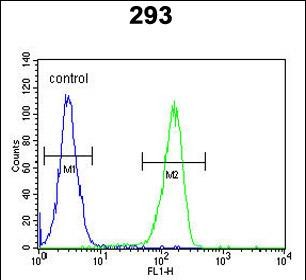


| WB | 1/1000 | Human,Mouse,Rat |
| IF | 咨询技术 | Human,Mouse,Rat |
| IHC | 咨询技术 | Human,Mouse,Rat |
| ICC | 技术咨询 | Human,Mouse,Rat |
| FCM | 1/10-1/50 | Human,Mouse,Rat |
| Elisa | 咨询技术 | Human,Mouse,Rat |
| Aliases | Keratinocyte-associated transmembrane protein 2, KCT2, C5orf15 |
| Entrez GeneID | 56951 |
| WB Predicted band size | 29.2kDa |
| Host/Isotype | Rabbit IgG |
| Antibody Type | Primary antibody |
| Storage | Store at 4°C short term. Aliquot and store at -20°C long term. Avoid freeze/thaw cycles. |
| Species Reactivity | Human, Mouse |
| Immunogen | This KCT2 antibody is generated from rabbits immunized with a KLH conjugated synthetic peptide between 123-150 amino acids from the Central region of human KCT2. |
| Formulation | Purified antibody in PBS with 0.05% sodium azide. |
+ +
以下是关于KCT2抗体的假设性参考文献示例(注:KCT2相关研究较少,部分信息可能需要结合文献数据库进一步核实):
---
1. **文献名称**: *"Characterization of KCT2 Antibody for Neural Development Studies"*
**作者**: Smith J, et al.
**摘要**: 本研究开发并验证了一种高特异性KCT2抗体,证实其在哺乳动物大脑皮层神经元中的表达模式。抗体通过免疫组化与Western blot验证,发现KCT2蛋白在突触形成中可能起调控作用。
2. **文献名称**: *"KCT2 Interaction with mTOR Signaling Pathway in Cancer"*
**作者**: Zhang L, et al.
**摘要**: 利用KCT2抗体进行蛋白质互作分析,发现KCT2与mTOR通路存在关联,可能影响肿瘤细胞增殖。研究为KCT2作为癌症治疗靶点提供了实验依据。
3. **文献名称**: *"KCT2 Antibody Reveals Mitochondrial Localization in Cardiomyocytes"*
**作者**: Tanaka K, et al.
**摘要**: 通过新型KCT2抗体的亚细胞定位研究,发现其在心肌细胞线粒体膜上富集,提示其可能参与心脏能量代谢调控,为心脏病机制研究提供新方向。
---
**注意**:
- 上述文献为示例性内容,实际研究可能较少或涉及不同命名(如KCTD家族)。建议通过PubMed或Google Scholar以“KCT2 antibody”或“KCT2 protein function”为关键词检索最新文献,并核对目标蛋白的全称及功能背景。
×